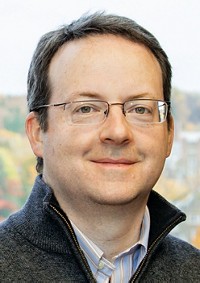Advertisement
Grab your lab coat. Let's get started
Welcome!
Welcome!
Create an account below to get 6 C&EN articles per month, receive newsletters and more - all free.
It seems this is your first time logging in online. Please enter the following information to continue.
As an ACS member you automatically get access to this site. All we need is few more details to create your reading experience.
Not you? Sign in with a different account.
Not you? Sign in with a different account.
ERROR 1
ERROR 1
ERROR 2
ERROR 2
ERROR 2
ERROR 2
ERROR 2
Password and Confirm password must match.
If you have an ACS member number, please enter it here so we can link this account to your membership. (optional)
ERROR 2
ACS values your privacy. By submitting your information, you are gaining access to C&EN and subscribing to our weekly newsletter. We use the information you provide to make your reading experience better, and we will never sell your data to third party members.
Environment
ACS Award For Affordable Green Chemistry
Recipients are honored for contributions of major significance to chemistry
by Melody Voith
February 2, 2009
| A version of this story appeared in
Volume 87, Issue 5
Sponsored by an endowment established by Rohm and Haas
When Geoffrey W. Coates embarked on his undergraduate studies at Wabash College, in Crawfordsville, Ind., he received an offer he couldn't refuse: If he majored in chemistry, he could attend college for free. Coates had received the highest score on a qualifying exam for a chemistry scholarship. The only problem was, as he remembers, "I wasn't that interested in chemistry." In fact, what he really thought he wanted was a career in architecture.
Coates blames his excellent high school chemistry teacher, Marie Hankins, for the predicament. But it all worked out. In the end, he took the scholarship, and in his second year he decided he liked chemistry enough not to change his major.
In graduate school at Stanford University, where he received a Ph.D. in 1994, and as a postdoctoral researcher at California Institute of Technology, Coates researched olefin polymerization. When he became an assistant professor of chemistry at Cornell University in 1997, he was able to strike out on his own in areas that interested him—environmentally friendly ingredients, renewable feedstocks, and polymers that would biodegrade.
At first there was not a lot of other interest in the field, according to Coates. The industry sponsors of a young faculty award suggested that if he stuck with polyolefins he would have better chances. But this time he followed his own interests. Inspired by two pioneers, Donald J. Darensbourg of Texas A&M University and Malcolm H. Chisholm of Ohio State University, Coates began to look for new catalysts to make biodegradable polymers.
Now, 20 years after deciding to stick with chemistry, Coates, 42, "has emerged as one of the world's most creative synthetic polymer chemists by designing and synthesizing new organometallic catalysts for providing viable processes for the preparation of 'green' polymers from sustainable raw materials," according to S. Richard Turner of Virginia Polytechnic Institute.
Plastics makers looking for nonpetroleum feedstocks and biodegradable polymers are experimenting with and commercializing three important types of polymers: aliphatic polycarbonates (APCs), polylactic acid (PLA), and poly(β-hydroxyalkanoates) (PHAs). Coates's research has led him to develop novel catalysts that make them less expensive to manufacture.
Biodegradable APCs can be made into optically clear films for food storage and other protective packaging or incorporated into polyurethane foams. At high tempertures, the polymers degrade and sublime without leaving a residue, making them useful for nanofluidics and electronics production. Coates describes zinc- and cobalt-based catalysts for epoxide-carbon dioxide polymerizations, which lead to APCs that are nearly 100-fold more active than earlier catalysts.
Consumers who are familiar with the current generation of biodegradable plastic utensils have some familiarity with PLA, first introduced by Cargill-Dow in the late 1990s. Coates's development of stereoselective catalysis routes to new microstructures holds promise for the next generation of biodegradable PLA. His isotactic stereoblock microstructure is highly microcrystalline; has higher thermal stability than current versions; and may find use in carpeting, textile fibers, and automotive applications.
PHAs, polyesters widely found in bacteria as a source of stored carbon and energy, hold promise as biodegradable substitutes for petroleum-based polypropylene. Currently, PHAs are made through fermentation. Coates has a potentially cheaper way—a bimetallic catalyst that uses commodity feedstocks.
In 2004, Coates, along with Scott D. Allen and Tony Eisenhut, founded Novomer to commercialize his discoveries. The company's first product is a grade of polypropylene carbonate called NB-180, a polymer binder that sublimates at a relatively low temperature for use in photolithography.
Coates continues to do research and teach at Cornell, where he is the Tisch University Professor. In 2001, he was awarded an ACS Arthur C. Cope Scholar Award. He has also been named the 2009 winner of the ACS Polymer Division's Carl S. Marvel Award for outstanding contributions as a polymer scientist under the age of 45.
Coates will present the award address before the Division of Organic Chemistry.





Join the conversation
Contact the reporter
Submit a Letter to the Editor for publication
Engage with us on Twitter